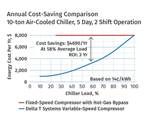More Examples of Advanced Chilling Technology
Now three chiller makers use variable-speed condensers to save energy.
Last month, we reported in a Close Up article on a new line of small portable chillers due to hit the market in July from Delta T Systems, Richfield, Wis., that is said to embody a unique collection of technologies and features that provide significant energy savings and process stability. Supporting the claim that these technologies establish a new benchmark for chiller efficiency is that fact that one other supplier is using two of these advances to achieve similar benefits—and, at press time, another chimed in with similar energy-saving technology.
NPE2015 in Orlanda, Fla., saw the introduction of the NQV portable chillers—10 and 20 tons, air or water cooled—from Thermal Care, Niles, Ill. (see June ’15 Keeping Up). It incorporates what both Thermal Care and Delta T Systems agree is the most significant recent advance in process chilling, the variable-speed condenser, which allows the chiller to operate over a wide range of loads without use of an energy-wasting hot-gas bypass valve. Variable-speed condensers have a 20-yr history in HVAC applications, but had not been used in process chillers.
Thermal Care’s NQV chillers also utilize the electronic expansion valve—rarely used before now on small portable chillers—which Delta T Systems credits with adding to the energy savings obtained with the variable-speed condenser.
Audrey Guidarelli, marketing services manager for Thermal Care, says the NQV chillers “have been highly successful products since their release in 2015” and that its “sales continue to grow as more of our customers understand the cost-saving benefits of using variable-speed compressor technology.”
Just before we went to press last month, Conair, Cranberry Township, Pa., a sister company of Thermal Care within the IPEG group, announced availability of 10- and 20-ton EP2 Series portable chillers (air or water cooled) with variable-speed condensers and premium touchscreen controls. They are said to deliver energy savings of 20-50% compared with conventional fixed-speed compressors and the latest digital scroll compressors. Both Conair variable-speed models are said to handle loads as low as 3 tons efficiently. The 20-ton unit incorporates a 10-ton fixed-speed and a 10-ton variable-speed compressor. With that unit, Conair notes, energy savings are not as significant in the middle range, where either compressor—fixed or variable—would be running at full capacity of 10 tons. But energy savings in the 3-8 and 13-16 ton ranges are still “impressive,” Conair claims.
Related Content
-
System Offers 'Lights Out' Mold-Channel Cleaning & Diagnostics
New system automatically cleans mold-cooling lines—including conformal channels—removing rust and calcium, among other deposits, while simultaneously testing for leaks, measuring flow rate and applying rust inhibitor.
-
Follow These Best Practices When Working With Heat Transfer Fluids
Effectively choosing, operating and maintaining thermal fluid can positively impact productivity in plastics processing.
-
Is Your Water System Setup Helping or Hurting Your Molding Plant Productivity?
The plant water system is a critical component of an injection molding facility. A poorly designed or maintained water-cooling system can have a serious impact on production efficiency and cause many maintenance issues. Here’s what you need to know — and ask — to prevent those problems.















